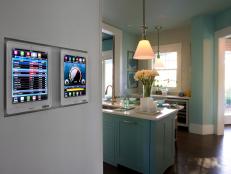Wireless Home Automation

HOWARD TUCKER 216-696-4616
Home automation systems have been around since at least the 1960s, when the "homes of the future" at Worlds Fairs and technology expos featured automated control of things like lighting, heating and air conditioning, and, of course, robot assistants.
The Smart Home of the Future
See All PhotosAll of those features (yes, including the robots) are available in today's home automation systems, but with one key difference—homeowners who want to control their home's systems no longer need to worry about poor system performance due to radio signals failing to travel from one end of the home to the other, a common frustration point for decades. Wireless home automation has solved this once intractable problem of home automation, offering consistent, fast and reliable signals to communicate with all manner of home control systems.
One of the great advantages of wireless home automation is the built-in failsafe of repeating signals. If a home is large enough to require wireless connectivity for its automation systems, it will likely feature multiple wireless devices communicating with each other to sustain the signal and ensure that all systems operate correctly. This is made easier by the fact that wireless devices are natural "repeaters," which means that each device in a wireless home automation system automatically repeats each signal it receives. As a result, it's much less likely that any particular signal will be dropped. The methods used to accomplish this failsafe vary by manufacturer, but the result is consistent—signals can travel farther and more reliably than they ever could before the advent of modern wireless technology.
It should be noted that despite the fact that wireless home automation offers great advantages over the hard-wired or radio-controlled systems of the past, the signal reach of wireless isn't infinite. In particular, automation systems that are implemented in large business complexes or extremely large homes often struggle to maintain wireless signals over vast distances and may need to deploy multiple wireless hubs in order to increase reliability. Still, even if your home is large enough to require a custom wireless automation system in this fashion, you're likely to experience great benefits in terms of reliability and ease of use compared to the alternative of a hard-wired or radio-controlled system.
Wireless technology has radically changed the way people connect to each other, putting the power of instant connection or information just a tap or swipe away—its revolutionary effects are widely recognized, and its impact on home automation systems cannot be understated. If you're considering installing a home automation system, whether it's a whole-house, integrated system, a single standalone system or a series of standalones, a good wireless network will help you control your home consistently and reliably.



















































